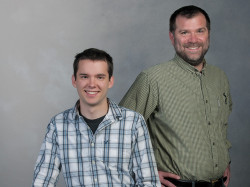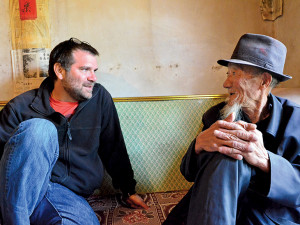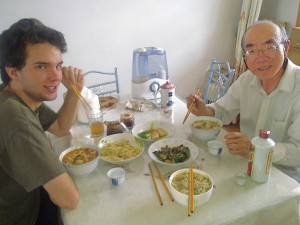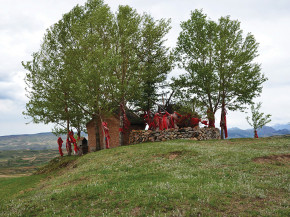Voices in Rural China
Associate professor of Chinese Keith Dede and Neil Murray CAS ’13 collect oral histories at the crossroads of Han Chinese, Tibetan, and Mongolian cultures.
by Romel Hernandez
Deep within the Sun Moon Mountains of China, Keith Dede, associate professor of Chinese, and Neil Murray CAS ’13 cling to their seats as they’re driven up a winding, potholed road to a tiny village in Qinghai Province.
For centuries this region along the Great Silk Road, which once connected Europe and Asia, has been a crossroads of Han Chinese, Tibetan, and Mongolian cultures and languages. Foreign visitors are rare in the remote villages of this part of the country, which even most Chinese consider to be the middle of nowhere. But Dede and Murray are on a mission.
Dede has recruited Murray to help collect the oral histories of area villagers who have experienced firsthand the profound changes in Chinese rural life following the Communist revolution of 1949. In other words, they are story seekers—and the stories they collect will help capture a disappearing culture before it’s too late.

Arriving at their destination, a small compound surrounded by a wall, the pair is at first greeted by a snarling guard dog. An elderly Chinese gentleman totters up to the gate, shoos away the dog, and ushers them through the gate, past a modest flower garden, and into his simple cinderblock home, which is topped with a small satellite dish. They pass through the central room, dominated by the family’s elaborately decorated spirit tablet, honoring deities and ancestors, and into one of the bedrooms, where visitors are typically received.
Tea is brought out and Dede and Murray sit on the kang bed, a platform heated by the nearby stove. Dede switches on the digital recorder, and they begin interviewing their subjects with the help of two assistants who help them translate the local dialect. For more than two hours, under the gaze of Chairman Mao’s portrait, they engage in a conversation that covers many facets of village life over the years. The locals detail their family histories and tell of the hardships of Mao’s Great Leap Forward in the 1950s, the upheaval of the Cultural Revolution in the 1960s, and the benefits of agrarian reforms in the 1980s.

“There’s a generation in Qinghai in their 60s, 70s, and 80s who have these very important memories, and they aren’t going to be around much longer,” says Dede. “We need to document this culture because it’s disappearing.”
Returning to the University of Washington, Dede went on to earn his doctorate in Chinese. He was drawn to study the language, he says, because of “the challenge of it—it’s endlessly complicated.”
Dede first became fascinated with China when he was in high school in New Jersey, where the Eurocentric education he received made him curious about all the things he didn’t know about Asia. At the time, China was big news. Dede vividly recalls being fascinated by newspaper accounts about Chairman Deng Xiaoping’s historic visit to the United States in 1979.
There’s a generation in Qinghai in their 60s, 70s, and 80s who have these very important memories, and they aren’t going to be around much longer. We need to document this culture because it’s disappearing. Keith DedeAssociate Professor of Chinese
Dede majored in East Asian studies at the University of Washington and spent a year and a half teaching English in the southwestern city of Chengdu during the student uprisings of 1989. While most of the action was in Beijing’s Tiananmen Square, authorities broke up student protests in Chengdu as well.
During graduate school, he became interested in the dialect spoken in Qinghai. Dede first visited the region in 1993 and has returned regularly for two decades. Just as the area is known as a cultural crossroads, it is also noted for its linguistic distinctiveness. The Qinghai dialect is as different from standard Mandarin as, say, a Jamaican patois is from the Queen’s English.
Most of Dede’s research in Qinghai has centered on linguistics, including a Fulbright-Hays backed trip in 2009 to start an in-depth study of the evolution of the dialect. After he befriended a local writer named Jing Shi (see next page), his interest in the region’s history and culture continued to evolve. Last year, he was awarded a Mellon program grant from Lewis & Clark to undertake the oral history project in the summer of 2012. There was just one thing left to do: pick a student partner for the trip. In Dede’s view, bringing a student along was essential. “Through my students, I see the culture and the environment in new ways,” he says. “For them, everything is new. They’ll ask questions I never would have thought about.”

Murray happened to be spending the spring term of his junior year studying in Beijing, so when Dede connected with him about the project, he was more than game to extend his stay in China and spend the summer in Qinghai. Dede couldn’t have found a more perfect student for the job than Murray. Experienced in Chinese language and culture, extremely polite and gregarious, and hailing from the mostly rural Upper Peninsula, Murray had the ideal background to relate to the people they would be interviewing in the hinterlands of Qinghai.
Dede arrived in Huangyuan County in Qinghai in late May, and Murray joined him after a 24-hour train journey on a hard seat (the proletarian way to travel) after his term ended in Beijing. Before getting started, however, they were obliged to be feted in a banquet hosted by the local secretary of the Communist Party. These highly ritualized dinners, featuring dozens of plates of food and plenty of free-flowing baijiu, a clear distilled liquor similar to vodka, are necessary to earn the blessing of local authorities.
The banquet was held in an ornate room of a building in the county seat. About 15 local dignitaries and guests were in attendance, with Dede seated at a place of honor at the circular table. To kick things off, the party secretary got to his feet to give a warm welcome to his honored guests—“This is your home,” he told them—followed by a rousing toast of Gan Bei! (the Chinese equivalent of “Cheers!”). Soon after, the food started to come—plate after plate of spicy lamb dishes, stir-fried potatoes, noodles, and much more placed on a lazy Susan in the center of the table. Along with the various dishes and regional delicacies, the revelers were given bowls of raw garlic to chomp on, a practice believed to promote good digestion.
According to custom, every guest was expected to toast every other person in attendance, followed by more shots of baijiu. Both Dede and Murray thanked their hosts for their hospitality. As the liquor flowed, so did the conversation. Murray recalls breaking theice with the local party propaganda chief by asking him about the Chinese drinking culture. “So he told me stories and got drunk, and he was happy,” Murray says.
Through my students, I see the culture and the environment in new ways. For them, everything is new. They’ll ask questions I never would have thought about. Keith DedeAssociate Professor of Chinese
Over the month to come, Dede and Murray got to interview more than a dozen subjects in various villages. There was the musician who invited his neighbors to bring their sanxian (a plucked-string instrument), erhu (violin), and chabo tingsha (finger cymbals) for a jam session of traditional songs, which, they explained to their visitors, “the young people have forgotten and are not interested in learning.” And the veteran of the People’s Liberation Army who told horrific stories about fighting in the Korean Civil War. And the farmer who wept recounting the hardships of the Cultural Revolution, when he was forced to work 20-hour days on a diet of little more than gruel. And the 94-year-old man who, curious about the United States, asked Dede if Americans really live to be 200 years old.
“No,” Dede replied with a chuckle. “If they’re lucky, they get to live as long as you.”
Once the summer was over, Dede and Murray returned to the States with a thousand memories and the satisfaction of a job well done. After graduating this spring, Murray plans to return to Taiwan to live and work and, eventually, to apply for graduate school. Dede, meanwhile, will continue with the painstaking work of translating and editing the transcripts from their travels, which he hopes to publish as an oral history of Qinghai.
“Too often, we look at history and see the machinations and movements and forget that these events had real consequences on real people,” Dede says. “My hope is that by publishing these stories, we will help show that the people of Qinghai are important and deserve to be heard.”
More L&C Magazine Stories
Lewis & Clark Magazine is located in McAfee on the Undergraduate Campus.
MSC: 19
email magazine@lclark.edu
voice 503-768-7970
fax 503-768-7969
The L&C Magazine staff welcomes letters and emails from readers about topics covered in the magazine. Correspondence must include your name and location and may be edited.
Lewis & Clark Magazine
Lewis & Clark
615 S. Palatine Hill Road MSC 19
Portland OR 97219


